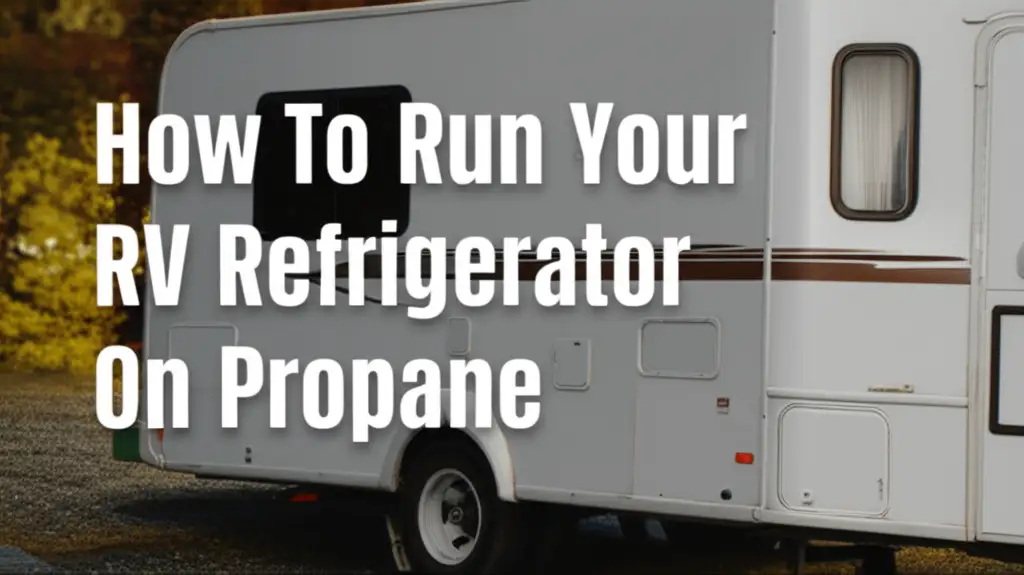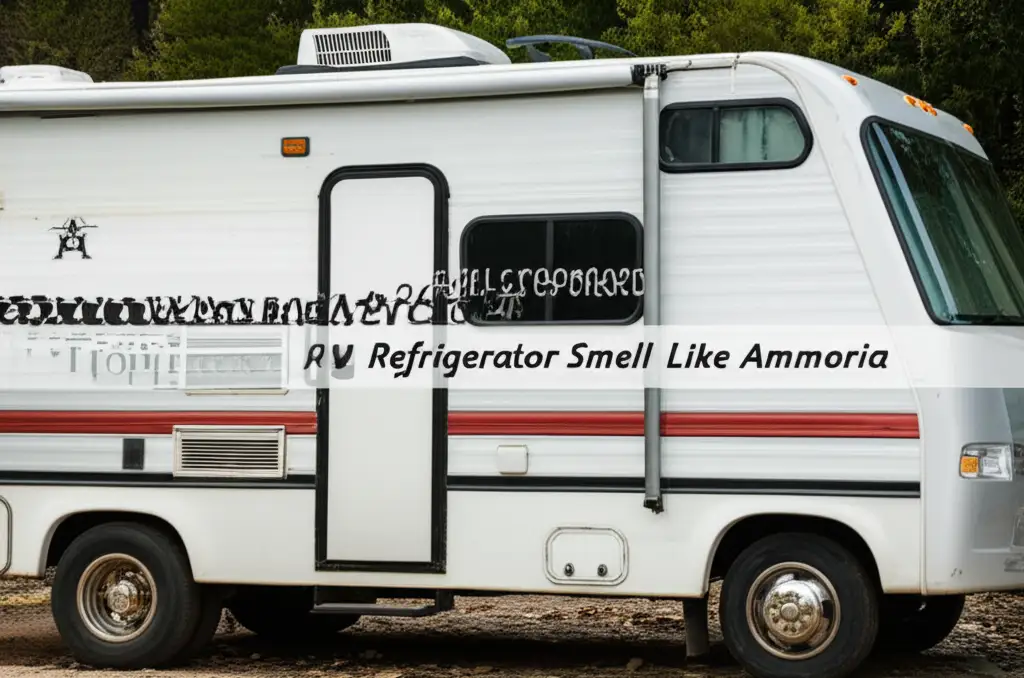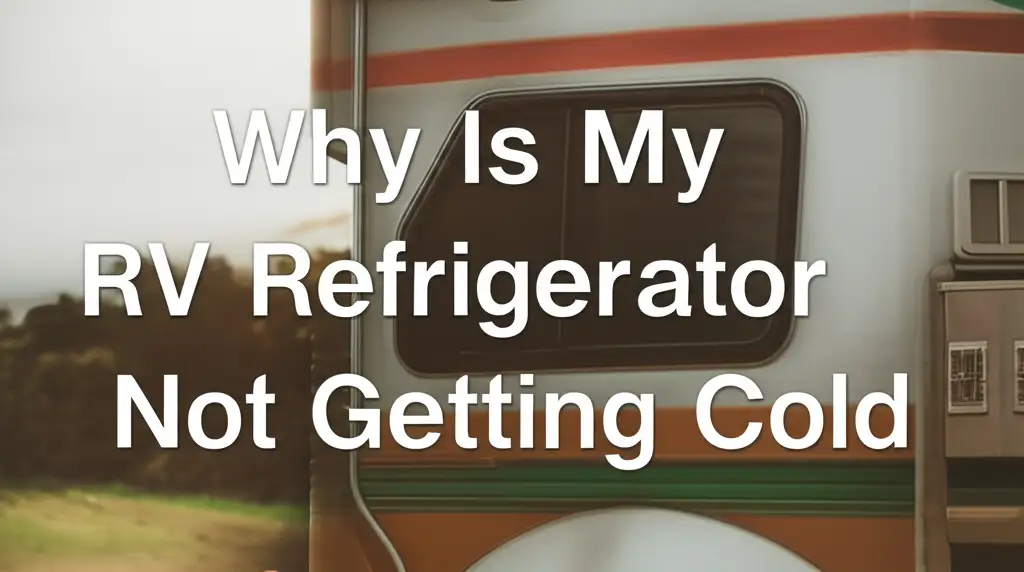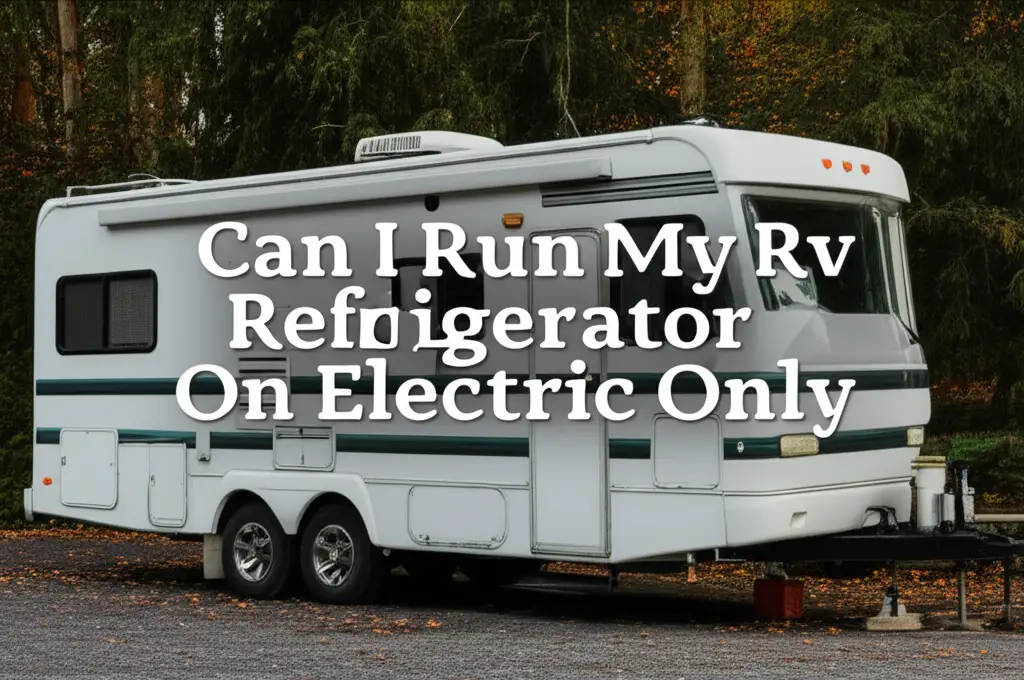· Kianna Connelly · RV Living · 16 min read
Can You Run An Rv Refrigerator On Propane While Driving
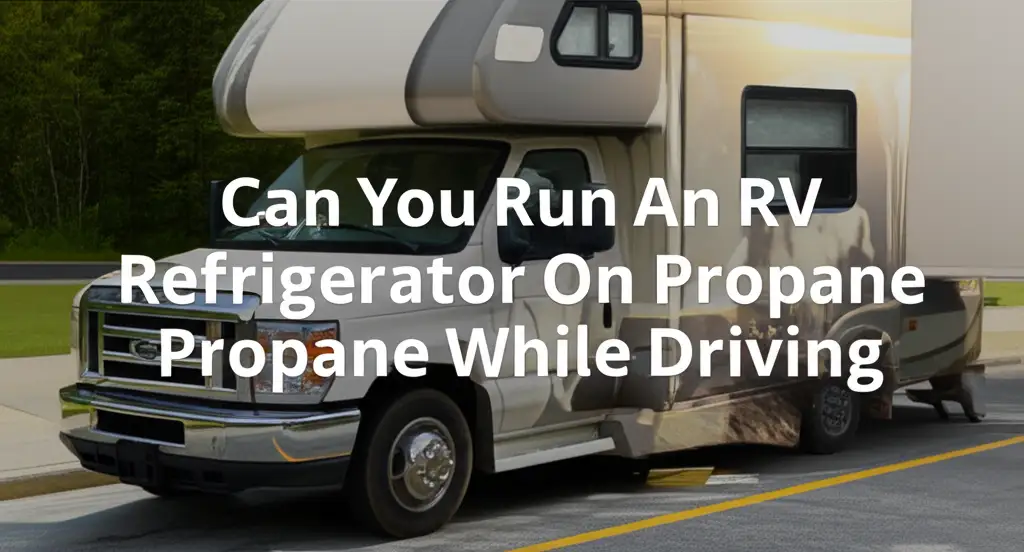
Running Your RV Refrigerator on Propane While Driving
As RV owners, we often face a common question: can you run an RV refrigerator on propane while driving? Keeping food cold on the road is important. Many RVs use propane for their refrigeration system. This method offers great convenience for travelers.
I remember my first RV trip. I wondered how to keep my groceries fresh for days. The thought of turning off the fridge meant spoiled food. This article gives a full guide on operating your RV refrigerator with propane during travel. We will discuss safety measures. We will also look at legal rules and efficient operation tips. By the end, you will understand how to manage your RV’s cooling needs on any journey.
Takeaway
- Yes, running your RV refrigerator on propane while driving is generally possible and common.
- Safety is paramount: Turn off propane at fuel stops, tunnels, and certain areas.
- Understand your fridge type: Most RV fridges are absorption models using propane or electricity.
- Consider alternatives: Battery power or 12V DC are options for shorter trips or specific situations.
- Pre-cool and monitor: Always pre-cool your fridge and monitor its temperature for best results.
You can run your RV refrigerator on propane while driving. This is a common practice for many RVers. However, it requires following specific safety guidelines and understanding how your appliance works to ensure a safe and efficient journey.
Understanding RV Refrigerator Basics and Propane Operation
RV refrigerators work differently from your home unit. Most RVs use absorption refrigerators. These models can run on propane or electricity. This dual-fuel capability gives RVers flexibility.
An absorption refrigerator uses a heat source to cool. This heat can come from an electric element or a propane flame. The heat starts a chemical reaction. This reaction moves refrigerant through coils. The refrigerant then removes heat from inside the fridge.
When you run your RV refrigerator on propane, a small flame heats a boiler. This process creates the cooling cycle. Even with propane, your fridge still needs 12V DC power. This low voltage power operates the control board and safety sensors. It keeps the gas valve open and monitors the flame. Without 12V power, the propane system cannot function. This is why a dead house battery can shut down your propane fridge. Learn more about power needs here: Does an RV refrigerator need electricity to run on propane.
Sometimes, RV refrigerators work fine on propane but not electric. This usually points to an issue with the electric heating element or the AC power supply. The propane system uses a different heating method. This means one system can fail while the other works perfectly. If your fridge cools on propane but not electric, inspect the electric side. You can often troubleshoot these issues. Find more details here: Why does my RV refrigerator work on propane but not electric.
I have found that understanding these basics helps me manage my fridge better. Knowing how the propane flame heats the coolant is key. It helps me troubleshoot minor problems. It also reinforces the need for consistent 12V power. Always ensure your RV batteries are charged. This ensures your propane fridge stays running.
The Safety Aspects of Running Propane While Driving
Safety is the top concern when using propane while driving. Propane is a highly flammable gas. A leak or malfunction could cause a fire. Modern RVs have safety features. These include propane leak detectors and automatic shut-off valves. These features add a layer of protection.
Despite these features, risk remains. The main concern is refueling at gas stations. Fueling stations have open flames and sparks from static electricity. A propane leak near these could be dangerous. It is standard practice to turn off your propane at the tank or appliance before entering a fuel station. This removes any risk of a fire or explosion.
Another risk involves tunnels and ferries. Some tunnels ban propane use due to limited ventilation. A propane leak inside a tunnel could be catastrophic. Ferry operators also have strict rules. They may require propane tanks to be turned off. Always check local regulations. State and local laws can vary greatly.
I always turn off my propane tank at the main valve before I pull into any gas station. This small step takes only seconds. It provides immense peace of mind. I also check for any visible damage to the propane lines. Regular inspections keep the system safe. This habit protects my family and others on the road.
- Key Safety Practices:
- Turn off propane at fuel stops: Always shut off the main propane valve before entering a gas station.
- Check tunnel/ferry regulations: Be aware of local laws regarding propane use in tunnels and on ferries.
- Regular inspections: Periodically check propane lines and connections for leaks or damage.
- Install detectors: Ensure your RV has working propane leak detectors. Test them regularly.
- Proper ventilation: Maintain good ventilation around the fridge’s exterior vents.
By following these safety guidelines, you can significantly reduce risks. Running your RV refrigerator on propane while driving can be safe and practical. Always prioritize safety over convenience.
Legal and Regulatory Considerations for Propane Use
Beyond general safety, specific laws and regulations govern propane use in RVs. These rules vary by location. It is important to know them for your travel route. Ignoring these laws can lead to fines or dangerous situations.
Many states have regulations about propane usage in vehicles. The most common rule relates to tunnels. Tunnels with restricted ventilation often prohibit vehicles with active propane tanks. This includes propane being used for appliances like refrigerators. Signs at tunnel entrances usually display these restrictions. Always look for these warnings. Planning your route helps avoid such tunnels. If you must use one, turn off your main propane tank valve.
Ferries are another area with specific rules. Most ferry companies require all propane tanks to be shut off before boarding. They may even require you to tag your propane tank as “off.” This is a safety measure to prevent leaks or fires on board. Always confirm the ferry operator’s policies beforehand. I have seen RVers turned away for not complying with these rules.
- Common Regulatory Restrictions:
- Tunnels: Many tunnels, especially longer ones, prohibit vehicles with active propane tanks. Signs will indicate this.
- Ferries: Almost all ferry services require propane tanks to be turned off.
- Fueling Stations: While not always a specific law, it is a widely accepted and highly recommended safety practice to turn off propane.
- State-Specific Laws: Some states might have unique rules regarding propane transport or use. Research your route.
Understanding these regulations helps you travel smoothly. It also keeps you safe and compliant. I always do a quick search for “propane restrictions [state name]” when planning a new long trip. This small step can prevent headaches. It helps me comply with all necessary rules. Being prepared allows me to enjoy my journey without worrying about legal issues or safety hazards.
Alternatives to Propane Operation While Driving
While propane is popular, it is not the only way to keep your RV refrigerator cold. Several alternatives exist for cooling your fridge while driving. These options can offer peace of mind or be more suitable for certain situations.
One common alternative is running your RV refrigerator on 12V DC power. Many RV absorption fridges are “three-way” models. This means they can run on AC power, DC power, or propane. When driving, your RV’s alternator charges the house batteries. This provides the necessary 12V power for the fridge. Running on 12V DC eliminates propane risks. However, 12V operation is less efficient. It draws a lot of power. This can drain your house batteries quickly if the engine is off. It also works best for maintaining temperature, not rapid cooling.
Another option is to use an inverter. An inverter converts 12V DC battery power into 120V AC power. If your RV fridge is a “two-way” model (AC/Propane) or a residential fridge, you can power it with an inverter. This uses your house batteries to supply AC power to the fridge. Like 12V DC, this method requires a robust battery bank. It also demands a strong inverter. It is suitable for longer drives where the alternator can keep batteries charged.
Finally, some RVers opt for simple passive cooling. This means pre-cooling the fridge before travel. Then, they simply keep the fridge door closed during the drive. For short trips, this can often maintain temperatures. You can add ice packs or frozen water bottles for extra cooling. This method carries no risk. It works best if you plan to reach your destination quickly.
I often combine methods. For long drives, I might start with propane. Then, I switch to 12V DC if I need to refuel soon. For overnight stops without hookups, I rely on my well-charged batteries. Knowing your options helps you choose the best cooling method for each leg of your journey. Each alternative has its own benefits and drawbacks. Consider your RV’s setup and your travel style.
Tips for Efficient RV Refrigerator Operation on the Road
Getting your RV refrigerator to perform its best on the road involves more than just turning it on. Proper operation ensures your food stays cold. It also maximizes energy efficiency. I have learned a few tricks over the years.
First, always pre-cool your RV refrigerator. Start it on propane or shore power at least 24 hours before your trip. This brings the interior temperature down to a safe level. A cold fridge works less hard to maintain temperature while driving. It is much easier to keep food cold than to make it cold.
Second, minimize door openings. Every time you open the fridge door, warm air enters. This forces the fridge to work harder. Plan your meals and grab items quickly. I try to get everything I need for a meal in one go. This simple habit saves significant energy. It also helps keep the internal temperature stable.
Third, load your fridge properly. Do not overpack it, but do not leave it empty either. A full fridge with cold items helps retain cold better. Leave some space for air circulation. Proper airflow is essential for absorption fridges to work efficiently. Avoid blocking the cooling fins inside.
- Pre-cool thoroughly: Start the fridge 24 hours before departure on shore power or propane.
- Minimize door openings: Reduce how often and how long you open the fridge door while traveling.
- Load efficiently: Fill the fridge with pre-chilled items. Allow space for air circulation.
- Monitor temperature: Use a thermometer inside the fridge. Ensure temperatures stay below 40°F (4°C).
- Consider leveling: While driving, minor unlevel conditions are usually fine. For extended stops, leveling your RV helps. This allows the absorption fridge fluid to flow correctly. If your RV is not level for too long, it can impact cooling efficiency. For more information, check out: Does an RV refrigerator have to be level to work.
These tips help me maintain optimal food safety. They also help me conserve propane or battery power. An efficient fridge means less worry on the road. It ensures my refreshments are always cold.
Addressing Common Concerns and Troubleshooting on the Go
Even with careful planning, issues can arise. Knowing how to address common RV refrigerator problems on the road saves stress. I have faced a few myself and learned to diagnose them.
One common concern is the RV refrigerator not getting cold enough. Sometimes, the freezer works, but the fridge section stays warm. This often points to insufficient airflow over the cooling fins. It could also be a dying cooling unit. A faulty thermistor can also cause this problem. The thermistor reads the internal temperature. If it gives a wrong reading, the fridge may not cycle correctly. You can often test a thermistor with a multimeter. For deeper dives into this issue, consult: Why is my RV refrigerator not getting cold but freezer is.
Another frequent issue involves the refrigerator fan. Many RV refrigerators have a fan to help dissipate heat from the cooling unit. Sometimes, this fan runs constantly. Other times, it cycles on and off repeatedly. A fan that runs too much might indicate insufficient airflow. It could also mean the condenser fins are dirty. A fan that cycles on and off frequently might be struggling to cool. Or, it could just be doing its job. You can find more details on this fan behavior here: Why does the fan in my RV refrigerator keeps running.
If your RV refrigerator stops cooling entirely, the cooling unit itself might be failing. This is a more serious problem. Signs include a strong ammonia smell or yellow residue. The cooling unit contains the chemicals that make the cooling possible. A leak means the unit is compromised. This requires professional repair or replacement. Learn how to identify this failure: How to determine if your RV refrigerator cooling unit has failed.
- Troubleshooting Steps:
- Check power source: Ensure propane flow is adequate or 12V power is present.
- Inspect vents: Make sure exterior vents are clear of obstructions.
- Verify levelness: For absorption fridges, confirm the RV is reasonably level for optimal operation.
- Listen for flame: On propane, listen for the consistent hum of the flame.
- Feel cooling fins: Check if internal cooling fins are cold to the touch.
By knowing these common problems and basic troubleshooting, I feel more confident on my travels. A little knowledge goes a long way. It helps me fix minor issues quickly. This keeps my food safe and my trip enjoyable.
Making the Right Choice for Your RV Travel
Deciding how to power your RV refrigerator while driving depends on several factors. There is no single “best” method. Your choice depends on your RV, your travel plans, and your comfort with propane.
For many RVers, running the refrigerator on propane while driving is the default. It is efficient and requires less battery power than 12V DC. This means you can keep your fridge cold for longer periods without shore power. It is especially useful for longer drives or boondocking. However, you must prioritize safety protocols. Turning off propane at fuel stops and tunnels is a must. This routine becomes second nature after a few trips.
If you prefer to avoid propane while driving, 12V DC or inverter power are good options. These are safer in terms of fire risk. However, they demand more from your RV’s electrical system. You need strong batteries and a good alternator. For shorter trips, these might be perfect. For longer journeys, you might need to stop more often to charge batteries. This ensures your fridge maintains temperature.
Consider your travel style. Do you take frequent short trips? Or do you go on extended cross-country adventures? Short trips might allow you to pre-cool and then rely on passive cooling or 12V. Longer trips often benefit most from propane’s efficiency. Think about where you plan to stop. Will you always have electrical hookups, or will you be boondocking?
- Evaluate your RV: Does it have a robust battery bank for 12V operation? Is your propane system in top condition?
- Assess trip length: Short drives (a few hours) might allow for passive cooling or 12V. Long drives (all day) benefit from propane.
- Consider safety comfort: Are you comfortable managing propane safety while driving?
- Plan your stops: Will you be at campgrounds with hookups or boondocking often?
Ultimately, the choice is yours. I always weigh the convenience of propane against the safety considerations. For my long journeys, propane remains my preferred method. For quick hops, I might just rely on my battery and a pre-cooled fridge. Understanding all your options empowers you to make an informed decision for every trip.
FAQ Section
Q1: Is it truly safe to run my RV fridge on propane while driving? A1: Yes, it is generally safe if proper precautions are followed. Modern RVs have safety features. Always turn off the propane supply at the tank before fueling your vehicle. Also, be aware of specific regulations in tunnels and on ferries that require propane to be turned off. Safety should always be your top priority.
Q2: What are the main risks of running an RV fridge on propane during travel? A2: The primary risks include potential fire hazards from leaks, especially near ignition sources like gas pumps. There’s also the danger of propane build-up in enclosed spaces like tunnels if a leak occurs. Always check for a good seal on your propane tank. Listen for any hiss that might indicate a leak.
Q3: Are there specific places where I cannot use propane while driving? A3: Yes, most notably at gas stations, in certain tunnels, and on ferries. Many tunnels have signs explicitly prohibiting vehicles with active propane appliances. Ferry operators also require propane tanks to be shut off before boarding. Always observe local signage and regulations for propane use.
Q4: How long can an RV refrigerator run on propane while driving? A4: An RV refrigerator can run on propane for several days, depending on the size of your propane tank and how often you open the fridge door. A typical 20-30 lb propane tank can power the fridge for 2-3 weeks in stationary use. While driving, the consumption is similar. This means you can typically run it for your entire driving day.
Q5: Do modern RVs have safety features for propane use on the road? A5: Yes, modern RVs are equipped with several safety features. These include propane leak detectors that sound an alarm if gas is present. They also have automatic shut-off valves. These valves stop the propane flow in case of a crash or major leak. Always ensure these systems are working correctly.
Q6: What are alternatives to propane for cooling my RV fridge while traveling? A6: You can run your RV refrigerator on 12V DC power from your RV’s battery, especially if it’s a “three-way” model. Some RVs can also power a residential-style fridge using an inverter. For short trips, pre-cooling the fridge and using ice packs can also keep items cold without any active power.
Conclusion
Running your RV refrigerator on propane while driving is a common and practical solution for keeping food fresh on the road. I have personally used this method for countless miles. It offers significant convenience for long journeys. Understanding how your absorption fridge operates on propane is the first step. Knowing that it still needs 12V power for its controls is key. This helps you troubleshoot common issues.
Safety must always be your top priority. Remembering to turn off the propane at gas stations is a simple yet vital habit. Awareness of local regulations in tunnels and on ferries also ensures a smooth trip. If you prefer not to use propane, alternatives like 12V DC operation or inverters offer other solutions. These alternatives work well, especially for shorter drives.
By pre-cooling your fridge and minimizing door openings, you can maximize efficiency. This ensures your food stays cold with less effort. Always monitor your fridge’s performance. Knowing basic troubleshooting steps will help you handle minor problems on the go. Armed with this knowledge, you can confidently embark on your RV adventures. Enjoy your travels, knowing your food will stay perfectly chilled. Make your next RV trip worry-free by preparing your refrigerator today!
- RV refrigerator
- propane RV
- driving RV
- RV safety
- absorption fridge


